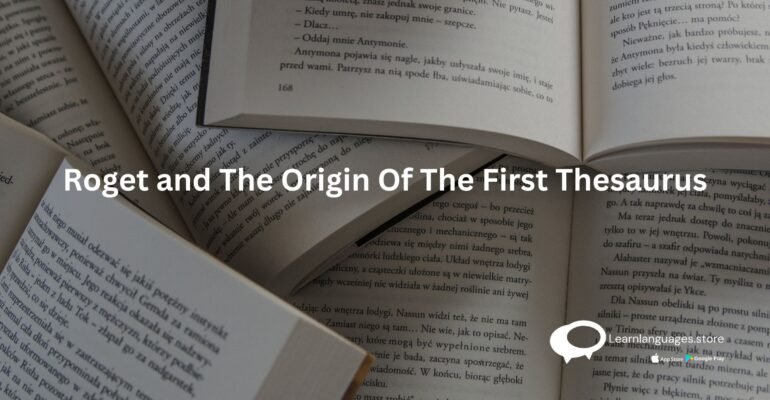Order From Tragedy: Roget and The Origin Of The First Thesaurus
Order From Tragedy: Roget and The Origin Of The First Thesaurus
Education Act of 1968, which funded bilingual education for American pupils.
Many English-only laws have exceptions for public safety and health, and some proponents believe that one official language would save government printing and translation costs (in Canada, federal and provincial governments spend up to $2.4 billion per year on bilingualism).
They face fierce opposition.
ACLU counterattacks. They write against the unconstitutionality of officializing a single U.S. language, citing James Adam’s 1780 “undemocratic” attempt to found an English academy.
In a country whose national holiday commemorates a fierce war for freedom and independence for all, some feel it patriotic to remark “This is America, we speak English here,” while others find it fundamentally undemocratic.
Good news? Everyone can think anything they want.
Would you believe that the U.K. has no official language?Beautiful Tools from Less Beautiful Circumstances—Peter Mark Roget (1779-1869)
Roget was extraordinary. A lexicographer who assisted most English speakers.
Doubt us?
You probably utilized his product. Your bookshelf may have one. Your PC will have one.
The thesaurus, naturally.

Roget wrote the first English-language versions of this in expensive book.
Crossword puzzlers, writers, students, journalists, and academics have utilized the thesaurus to improve their language and writing since its publication.
Digitization and inclusion into word processing tools like Microsoft Word increased its popularity. Right-clicking now finds synonyms.
Dr. Roget had a curious intellect and a wide range of interests, abilities, and talents. He enjoyed beekeeping, chess, the kaleidoscope, and cinematics, working with numerous scientists and professors while practicing medicine.
However, a tragic event drove him to write a book that would become one of the most helpful English reference books.

Escape From Madness: The Man Who Made Lists for Mental Illness
Dr. Roget was traumatized from birth.
Lifelong depression plagued Peter. After his father died when Peter was four, Catherine never recovered. Catherine was unpleasant, demanding, and paranoid, accusing the staff of scheming against her.
His sister and grandmother were depressed and schizophrenic. Similar issues plagued his daughter. Most tragically, Peter was present when his uncle Sir Samuel Romilly committed suicide.
Peter’s familial tragedy would be hard for anybody to bear.

Peter Mark Roget was different.
To cope with his terrible family circumstances, Peter obsessively made lists from age 8.
The History of Roget’s Thesaurus—One of the Most Widely Used Reference Works Ever Published
Peter started his reverse dictionary, a compendium of synonyms, at 26.
His synonym compendium quickly became more than a hobby. It helped him cope with his extensive tragedy.
He sought words with purpose. Peter found stability in organizing words by subject and discipline.
This concern with organization was classic obsessive-compulsive behavior—rigid, inflexible, and constrained by order.
However, gathering 15,000 synonyms in his private collection was difficult. The thesaurus reflects Peter’s many academic interests. One man’s expertise to encompass so many subjects is amazing.
Peter, a scholar, named his invention in Greek. His curating word shows his love of words. Thesaurus was his “treasure house.”
First Thesaurus
Peter’s thesaurus began privately. He considered organizing and publishing it in the 1840s after retiring from professional life.
To make his synonyms accessible, Peter spent years creating and honing an indexing system inspired by book, plant, and animal classification systems. During retirement, this massive undertaking occupied his mind.
Since 1852, Roget’s Thesaurus of English Words and Phrases has been in publication.
In the 1920s, crossword puzzles made the thesaurus popular in America. Every library reference department now has the book.
After Peter’s death in 1869, his son John Lewis Roget improved and extended the thesaurus, and John’s son Samuel Romilly Roget continued the lexicographical dynasty into the mid-20th century, making Roget’s thesaurus what it is today.
It is amazing that a library staple was designed to cope with mental illness.

Noah Webster: American English Dictionary Creator
The first American English dictionary had a similar story.
Noah Webster, who shaped American English, wrote a superb mental health reference book.
After graduating, Noah wrote books to help kids learn English to cope with depression and OCD. These popular “Blue-Backed Speller” booklets sponsored his dictionary.
Noah intended to standardize North American English dialects in his word collection. In 1828, he released the first dictionary with more than 12,000 uniquely American words and standardised American English spellings.
Learn Languages Store
Vashi,
Email: services@learnlanguages.store










